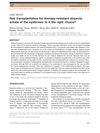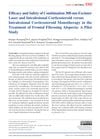 68 citations,
January 2007 in “Journal of Cosmetic and Laser Therapy”
68 citations,
January 2007 in “Journal of Cosmetic and Laser Therapy” Laser/light treatments for hair loss are popular but lack scientific data proving effectiveness.
[object Object]  15 citations,
May 2017 in “Lasers in Medical Science”
15 citations,
May 2017 in “Lasers in Medical Science” Low-level laser treatment helps mice grow hair by increasing certain protein levels linked to hair growth.
 95 citations,
November 2016 in “Journal of The American Academy of Dermatology”
95 citations,
November 2016 in “Journal of The American Academy of Dermatology” Treatments for permanent hair loss from scarring aim to stop further loss, not regrow hair, and vary by condition, with partial success common.
 11 citations,
August 2010 in “Journal of Dermatology”
11 citations,
August 2010 in “Journal of Dermatology” Hair transplantation can effectively treat stable eyebrow hair loss in alopecia areata patients.
April 2024 in “Journal of clinical medicine” Effective treatment guidelines for frontal fibrosing alopecia are still unclear.
 July 2018 in “Elsevier eBooks”
July 2018 in “Elsevier eBooks” Up to half of people experience itchy scalp, often due to skin conditions like seborrheic dermatitis or psoriasis, and treatments vary based on the specific cause.
 January 2016 in “Springer eBooks”
January 2016 in “Springer eBooks” Alopecia Areata is an unpredictable autoimmune hair loss condition with limited and variable treatment effectiveness.
 August 2022 in “IntechOpen eBooks”
August 2022 in “IntechOpen eBooks” The best treatment for Frontal Fibrosing Alopecia and Lichen Planopilaris combines oral and topical medications to reduce symptoms and stop hair loss.
 November 2023 in “Deleted Journal”
November 2023 in “Deleted Journal” Combining laser and corticosteroid is not better than corticosteroid alone for treating frontal fibrosing alopecia.
 2 citations,
December 2020 in “American Journal of Dermatological Research and Reviews”
2 citations,
December 2020 in “American Journal of Dermatological Research and Reviews” The combination therapy was effective and well-tolerated, especially in young patients.
 April 2008 in “Medical & surgical dermatology”
April 2008 in “Medical & surgical dermatology” Certain hairstyles can cause scalp diseases, smoking is linked to hair loss, 5% minoxidil foam is effective for hair loss treatment, and various factors influence wound healing and hair growth.
 14 citations,
January 2006 in “Skinmed”
14 citations,
January 2006 in “Skinmed” A woman developed white patches on her skin and curly hair after hepatitis C treatment, likely due to the medication interferon alpha.
9 citations,
May 2016 in “Clinics in dermatology” Phototherapy can help treat hair loss in alopecia areata.
 April 2018 in “Journal of Cosmetic and Laser Therapy”
April 2018 in “Journal of Cosmetic and Laser Therapy” The editorial introduces studies on various cosmetic and laser treatments, their effectiveness, and posttreatment care.
[object Object]  August 2023 in “Dermatology and Therapy”
August 2023 in “Dermatology and Therapy” Experts recommend personalized treatment plans for best outcomes in managing Alopecia Areata.
 December 2022 in “Medical lasers”
December 2022 in “Medical lasers” Low-level laser therapy may help with hair regrowth in alopecia areata but its effectiveness for psoriasis and atopic dermatitis needs more research.
 8 citations,
June 2019 in “Journal of Cosmetic Dermatology”
8 citations,
June 2019 in “Journal of Cosmetic Dermatology” Using a nonablative fractional laser with topical minoxidil can effectively and safely promote hair regrowth in alopecia areata patients.
 98 citations,
May 2008 in “British Journal of Dermatology”
98 citations,
May 2008 in “British Journal of Dermatology” There are many treatments for permanent hair loss disorders, but their effectiveness varies and there's no clear best option.
 November 2020 in “Postepy Dermatologii I Alergologii”
November 2020 in “Postepy Dermatologii I Alergologii” Sulfotransferase SULT1A1 activity may predict minoxidil treatment success for hair loss.
31 citations,
July 2021 in “ImmunoTargets and therapy” Alopecia areata is an incurable autoimmune condition causing hair loss, with research aiming for better treatments.
 31 citations,
September 2014 in “Journal of Pharmaceutical Sciences”
31 citations,
September 2014 in “Journal of Pharmaceutical Sciences” Using a special laser can improve how well hair loss treatments get into the skin and hair follicles.
 37 citations,
May 2016 in “Deutsches Arzteblatt International”
37 citations,
May 2016 in “Deutsches Arzteblatt International” Hair loss requires customized treatments based on its various causes and types.
 12 citations,
January 2008 in “Drugs”
12 citations,
January 2008 in “Drugs” Some topical treatments like corticosteroids and vitamin D analogues are effective for scalp psoriasis, but more long-term data is needed.
 2 citations,
January 2019 in “Springer eBooks”
2 citations,
January 2019 in “Springer eBooks” Segmental Vitiligo is a stable, early-onset form of vitiligo that responds well to early treatment and is ideal for repigmentation studies.
 67 citations,
January 2013 in “Indian Journal of Dermatology, Venereology and Leprology”
67 citations,
January 2013 in “Indian Journal of Dermatology, Venereology and Leprology” The document concludes that alopecia areata is an autoimmune disease without a definitive cure, but treatments like corticosteroids are commonly used.
 35 citations,
May 2012 in “Expert Opinion on Pharmacotherapy”
35 citations,
May 2012 in “Expert Opinion on Pharmacotherapy” The document concludes that there are various treatments for different types of alopecia, but more research is needed for evidence-based treatments.
 4 citations,
March 2018 in “Daehan han'yi hag'hoeji/Journal of Korean medicine”
4 citations,
March 2018 in “Daehan han'yi hag'hoeji/Journal of Korean medicine” Astragalus membranaceus helps regrow hair and reduce hair loss symptoms.

Alopecia Areata has no cure, treatments are limited, and the condition often recurs, but new therapies like JAK inhibitors show promise.
 2 citations,
January 2009 in “Actas Dermo-Sifiliográficas”
2 citations,
January 2009 in “Actas Dermo-Sifiliográficas” Scalp psoriasis treatments like strong corticosteroids and vitamin D3 analogues are effective, especially when combined.
 July 2024 in “Clinical Cosmetic and Investigational Dermatology”
July 2024 in “Clinical Cosmetic and Investigational Dermatology” Non-drug therapies show promise for hair regrowth but need more research.



























